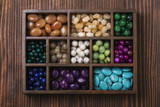The Deep Symbolism of Precious Stones

Do you ever sit and just gaze at the precious stone settings in your necklace or ring? Well, you’re not alone. Humans have been fascinated by the striking beauty of precious stones for millennia. Unsurprisingly, these naturally occurring treasures have found their way into humanity’s myths and legends. There are ancient stories hidden away in the twinkling of your diamonds, the burnished glow of garnet, and the galactic textures of a lapis lazuli pendant.
Read on to learn more about the meaning and mythos of four precious stones.
A Dream of Opals
Though they are found in other places, opals are an iconic Australian gemstone , found in our soil in greater abundance than anywhere else. It’s no surprise that opals have found their place in the rich Dreamtime mythology of the Aboriginal nations, which stretches back more than 60,000 years before European colonisation.
In one Dreamtime tale, it is said that the Creator came to earth on a rainbow bearing a message of unity for humanity. Where the Creator's foot touched the earth, the stones vibrated, sparkled, and filled with life force – and these became opals. Another tale tells of a bronze-winged bird, named Marnbi, who threw a firestick high into the air. When it landed, a myriad of bright, otherworldly sparks were thrown in all directions and these coalesced into opals.
Sapphires: a Multitude of Meanings
The sapphire is a particularly beautiful precious stone and one that has been known to humanity since at least the ancient Greeks. As such a popular gemstone, and one that occurs in so many colours, it is natural that we find many meanings for these stones.
The ancient Persians believed that the earth itself rested atop a gigantic blue sapphire and that the reflections from the stone gave the sky its colour. Blue gemstones are the most common and have symbolised honesty, trust, and commitment since antiquity. The Greeks gave rings of blue sapphire to signify lasting friendship and they are perennially popular for engagement rings.
But there is much more to sapphires. Every colour has its own unique meaning – pink sapphires are said to heal emotional wounds, yellow sapphires can overcome shyness and white sapphires reveal truths.
Glittering God’s Tears
According to ancient Greek legend, diamonds are the tears of weeping gods – in Hindu mythology, they are sparks flung from divine lightning striking stone. Either way, there is clearly poetry to these beautiful precious stones. Diamonds have been a symbol of wealth and opulence since time immemorial, but they are so much more. To the high priests of ancient Judaism, a diamond held before an accused person could determine their guilt. If it clouded, the person was guilty and if they were innocent, the diamond sparkled.
To the Persians, diamonds were temptations created by Satan to lead humanity astray. Some kings of old would encrust their armour with diamonds in the belief it brought divine protection in battle and even today many believe diamonds and other precious stones can heal illnesses and protect against harm.
The Moon's Gift of Pearls
The somewhat miraculous way pearls are formed, combined with their rarity, has always made them a highly valuable and sought after precious stone. Many cultures have stories about pearls, but the most interesting and beautiful come from China.
The origin of pearls, according to Chinese legend, was violence. When dragons tore and burnt each other to death in fierce battle amongst the clouds they damaged the clouds themselves and fragments fell into the sea as pearls. This link to dragons continues on in later mythology. There is a story of a young boy who discovered that a pearl would magically replenish his jar of rice. When jealous neighbours tried to steal the pearl, the boy swallowed it and was transformed into a dragon.
History, mythology and storytelling – precious stones are much more than just their alluring surfaces. To find a piece that speaks to you, or to create a meaning of your own, explore the range at Harrington & Co. For more advice on purchases, don’t hesitate to call 07 3891 3880 or email mark@hnco.com.au.
